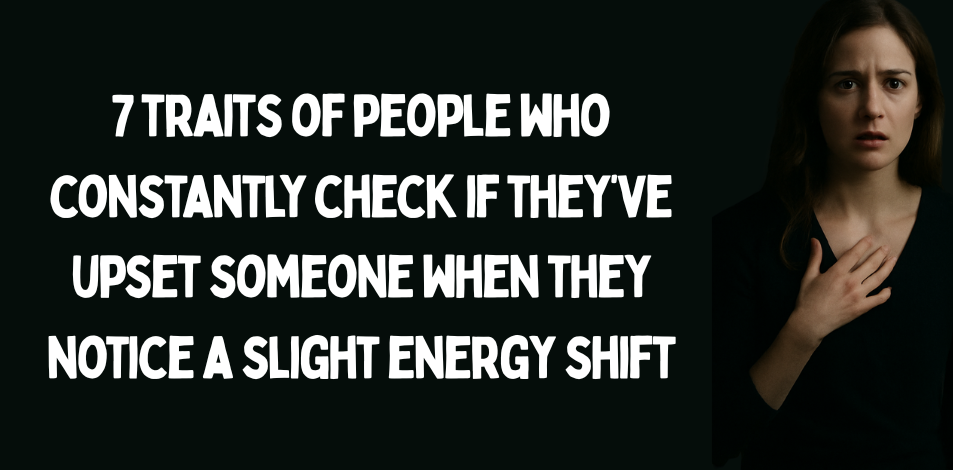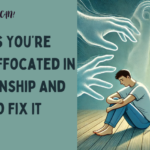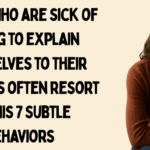
There’s a unique type of person who senses even the slightest shift in the energy around them. They’re the ones who constantly worry that they’ve caused an upset, even if there’s no obvious sign.
This sensitivity to subtle shifts in mood or atmosphere is a trait not everyone possesses. It’s both a blessing and a curse, making these individuals highly empathetic, but also, at times, extremely anxious.
In this article, I’ll delve into the seven traits of these highly sensitive souls. By understanding these characteristics, you’ll gain new insights into your own behavior and the behavior of those around you.
It’s all about fostering self-awareness and empathy—two essential elements in navigating the complexities of human interaction.
So, if you’re someone who constantly asks, “Did I upset you?” when you notice a change in energy, this article is for you. Let’s explore the traits that make you hyper-aware, and perhaps help you manage them better.
1) They Are Highly Observant
People who constantly check to see if they’ve upset someone are usually hyper-observant of their surroundings. They notice subtle expressions, tone of voice, and body language that others might miss.
This intense observation allows them to pick up on even the slightest change in a person’s energy or mood. It’s as if they have an internal radar constantly on the lookout for emotional shifts.
While this trait can be exhausting, it’s also a testament to their deep empathy and concern for others. They don’t just care about their own feelings, but are acutely aware of how others might be feeling as well.
However, this can also lead to anxiety, especially when they misinterpret these signals or assume unnecessary responsibility for others’ feelings. It’s essential for them to learn to recognize and establish emotional boundaries.
Remember, the ability to observe is powerful—it enhances understanding and communication. But it’s equally important to balance it with self-care and common sense. It’s not always about what you did or didn’t do. Sometimes, people have difficult days.
2) They Tend to Overthink
I admit, I’m an overthinker. When I notice even a slight change in someone’s energy, my mind races. I replay conversations and interactions, looking for any sign that I said or did something wrong.
It’s as if there’s a constant internal dialogue going on, asking, “Did I upset them? Was that something I said? Should I have acted differently?”
Overthinking is a common trait among those sensitive to energy shifts. It stems from a deep desire to maintain harmony and avoid conflict.
But here’s the thing—I’ve learned that overthinking often creates problems that didn’t exist in the first place. It magnifies small problems and can lead us to misinterpret people’s actions and intentions.
Over time, I’ve had to learn to silence this inner chatter, take a step back, and realize that not every energy shift is about me or something I did. And trust me, it’s still a work in progress.
If you’re an overthinker like me, remember this: Not every scenario needs to be dissected and analyzed. Sometimes, it’s okay to let things be.
3) They are often empathic.
Empathy is the ability to understand and share the emotions of others. Some people, known as empaths, possess this ability in abundance. They can deeply feel the emotions of those around them, as if they were their own.
Studies indicate that approximately 1 to 2% of the population are true empaths. This trait is often seen in people who constantly check to see if they’ve upset someone when they notice a subtle energy shift.
RELATED:7 ways being in a relationship with a narcissist will change you forever, according to psychology
Empathy can be both a blessing and a curse. On the one hand, empaths’ deep understanding of others’ emotions makes them excellent listeners, friends, and partners. On the other hand, experiencing such depth and intensity can be exhausting.
If you’re an empath and often find yourself worrying about upsetting others, it may be helpful to set some emotional boundaries. This doesn’t mean isolating yourself from others, but rather learning to protect your own emotional well-being while still caring for those around you.
4) They avoid conflict
People who rush to check if they’ve upset someone often have a strong aversion to conflict. They’re peacemakers, preferring to suppress their feelings rather than cause disagreement or upset.
This trait often stems from an innate desire for harmony and balance. They strive to ensure everyone’s happiness and satisfaction, even if it means neglecting their own needs and desires.
However, constantly avoiding conflict can lead to repressed feelings and unaddressed issues. It’s important for these individuals to understand that conflict, when handled constructively, isn’t necessarily a bad thing. Rather, it can lead to growth, deeper understanding, and better relationships.
Remember, it’s okay to express your thoughts and feelings. Not everyone will always agree with you, and that’s perfectly normal. Healthy relationships are able to endure disagreements and grow through them.
5) They Have High Standards for Themselves
I’ve always been a perfectionist. I set high standards for myself and always strive to do my best in every situation. This applies to my relationships as well.
I do my best not to upset or disappoint those around me. Whenever I feel a slight shift in my energy, I immediately wonder if I’ve done something wrong. I feel like I’ve failed in some way, even if there’s no clear evidence of it.
This is a common trait among those who constantly check to see if they’ve upset someone when they notice a subtle shift in their energy. They have high expectations of themselves and feel a deep responsibility for the well-being and happiness of others.
While it’s great to aspire to be the best person you can be, it’s also important to recognize that no one is perfect. We all make mistakes, and that’s normal. It’s our way of learning and growing.
If you’re like me and tend to be hard on yourself, try practicing self-compassion. Remember that it’s okay not to be perfect. Be kind to yourself, just as you would be to a friend.
6) They Have Innate Intuition
Individuals who constantly check to see if they’ve upset others often have strong intuition. They have an innate ability to pick up on and interpret subtle cues that others might overlook.
Their intuition acts as an inner guide, alerting them to potential emotional shifts in their environment. This can be extremely helpful in understanding and navigating complex social dynamics.
However, this over-intuition can sometimes lead them to overanalyze situations or take responsibility for others’ feelings. It’s important for these individuals to balance their intuitive insights with logical reasoning, and to remember that they cannot control others’ emotions or reactions.
If you identify with this trait, take a moment to appreciate your intuitive abilities. It’s a gift, allowing you to connect deeply with others. But don’t forget to also be aware of your own needs and feelings. Your intuition is there to guide you in all aspects of life, not just your relationships with others.
7) They Are Deeply Considerate and Caring
At the heart of these traits is a deep sense of concern and consideration for others. Those who constantly check to see if they’ve upset someone when they notice a subtle shift in their energy are often the most compassionate and caring people you’ll meet.
They deeply value their relationships and are willing to go the extra mile to ensure the well-being of those around them. Their sensitivity can sometimes seem like a burden, but it’s also a testament to their capacity for empathy and compassion.
RELATED:7 things a man will instinctively do when he’s genuinely in love, according to psychology
Remember, this deep concern for others is what makes you a wonderfully empathetic person. But don’t forget to show the same care and kindness to yourself. After all, you can’t pour from an empty cup.
Conclusion: It’s about understanding, not judgment.
The nuances of human behavior are complex and highly personal. Our reactions, perceptions, and emotions are shaped by multiple factors, both internal and external.
For those who constantly check to see if they’ve upset someone when they notice a subtle shift in their energy, it’s often a reflection of their deep empathy and sensitivity. These individuals possess an innate ability to perceive subtle shifts in the emotional landscape around them.
Carl Jung once said, “Whatever disturbs us in others can lead us to an understanding of ourselves.” This aphorism applies here. If you find yourself identifying with these qualities, this will be an opportunity to understand yourself better and grow through that understanding.
Remember, it’s okay to be considerate of others’ feelings; it’s a sign of empathy and compassion. But it’s equally important to take care of your own mental health.
So, the next time you feel a shift in your energy and wonder if you’ve upset someone, take a moment for self-reflection. Recognize that while your concern for others is admirable, every emotion or reaction is not your responsibility.
Embrace your sensitivity, but also learn to let go when needed. After all, in the dance of human interaction, it takes two to dance.




